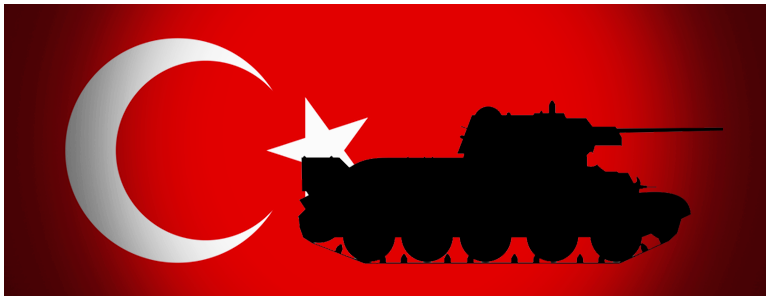
On Friday of last week, Turkish military forces staged a coup d’etat, and things got really bad for a few hundred Turks in the process.
There are some people who see the military’s attempted takeover as an unnecessary act by violent rebels, hellbent on subverting Turkey’s constitution. Conversely, others see the Turkish military as heroes who took harsh but necessary steps to ensure the protection of their constitution from politicians who desire to transform Turkey’s secular government into an Islamic theocracy.
Maybe one side is right and the other is wrong. Maybe both of them are wrong. Frankly, I don’t care to share my opinion or engage in philosophical inquiry into the matter. What I propose we do is take a step back and consider the larger implication: Not much had to change before Turkish citizens went from being safe and secure to being killed in the streets, and there’s a lesson to be learned in that.
People killing people, the sad history of the world.
One of my favorite movies is an early 2000s zombie flick called 28 Days Later. The premise of this film is basically the same as every other zombie movie. Our hero, a mild-mannered everyman, wakes up from a coma to find that the world went dirty-side-up while he was sleeping. He ultimately hooks up with a group of survivors who are led to a military installation that promises safety from the roaming zombie hoards.
Surprise of surprises, when the hero and his friends arrive at said military installation they find that it is run by a cruel British Army Major who intends to repopulate the world, starting with our hero’s girlfriend, by way of forced intercourse. You could say that this military safe haven was not all it’s cracked up to be.
Now, the thing that makes this movie one of my favorites is not all the cliched zombie stuff. In fact, that’s all rather taxing. The movie’s brilliance is found in its astute commentary on human nature. Zombies are just the mechanism by which the film reveals a simple truth: we’re only a few steps away from the natural brutality of the world that is always lurking beneath the surface, irrespective of the specific form the threat to our security may take.
One particular scene illustrates this point quite well and makes the case that safety is only an illusion whether we’re awash in the undead or otherwise. As the soldiers are all sitting around the dinner table chatting to the civilians they’ve “rescued,” one speaks up and explains how doomed the surviving humans are. The Major fires back and explains that, in his view, their current predicament is just another version of how the world has always worked. He says, “This is what I’ve seen in the four weeks since infection: people killing people. Which is much what I saw in the four weeks before infection, and the four weeks before that and before that, as far back as I care to remember. People killing people.” While he is unquestionably the bad guy of the film, there’s some wisdom in his words.
We are so fortunate to live in a nation where we have experienced vast periods of relative peace and safety, the likes of which have never been seen before in human history. The average American citizen (or, heck, even the most unfortunate American citizen who lives in the worst neighborhood in the country) has it better than 99.99% of all humans who have ever existed.
But make no mistake about it, as wonderful (and hopefully enduring) as this security may be, it’s still only a facade. I don’t mean that in a negative way. The American way of life is something that I believe so strongly in that I’d sacrifice everything for it. But the cold, hard reality is that, despite our best efforts, we humans are still just smart beasts, driven by beastly and selfish compulsions, and the only thing standing between order and chaos is the agreed-upon idea that we’re all better off by banding together and uniting as a people toward a common goal. But what Turkey’s coup illustrates all too well is that disagreements about how such an alliance should work can quickly tear through the facade, resulting in a grim outcome for many in the process.
In other words, when you depend on a system and its agents as your sole means of security, your safety is only as guaranteed as human frailty is tempered. This, my friends, is why one must take their personal safety personally.
Two tough questions you need to ask yourself.
It’s easy to watch what happened in Turkey on the news as dismiss it as a problem of the third-world, but let’s maintain some perspective. Turkey isn’t some depleted dust bowl whose citizens are starving to death. It’s not a desolate wasteland that is lorded over by a dictator, an Ayatolla, or an exalted emperor. It is a liberal democracy (liberal in the sense of classical liberalism, meaning the belief that people have rights and the freedom to do what they want, not “liberal” as it is used in the modern sense to refer to left-leaning political philosophy), much like America and other Western countries. To think that what happened in Turkey can’t happen in other parts of the world is to ignore all of human history where such violent and abrupt changes in the political order have long been the norm.
Thus, there are two questions we need to ask ourselves:
- Is our system of government so good that we can entirely rule out the possibility of things going downhill in a violent way in America?
- If it’s possible that the very people we rely on for protection can inflict harm on us (as happened in Turkey), is it wise to fully entrust one’s safety entirely to someone else?
As to the first question, certainly, our system of government makes it less likely for something like what happened in Turkey to happen in America, and our military and police are most often the best among us and the most interested in doing what’s right. That’s something to be proud of, but to believe that that could never change is to be flexible in the face of reason.
Just consider how different things would be if suddenly our military or police were populated primarily by members of whatever extreme or radical group that gives you the heebie-jeebies, be it the Westboro Baptist Church, the Black Panthers, the Klu Klux Klan, PETA, the band One Direction, or the cast of Friends. Change that one thing and suddenly everything changes. By and large, Americans are awesome people, but we’re still just that: people. As long as that’s the case, there is always the possibility that the safety that we take for granted could become less than guaranteed if we rely on others to provide it.
As to the second question, why risk it? If you have the tools available such that you can learn to defend yourself and therefore not need to rely on others for your safety, why wouldn’t you want to develop these tools?
Assuming I’m right, what does this mean for you?
The comedian David Cross has a stand-up bit where he talks about how little it affects his daily life when the DHS changes the terrorist threat level. He acts out a scenario where a husband tells his wife that the government raised the threat level to code magenta. “Oh no,” she says. “What do we do?” The husband responds, “Well, get the bread out of the oven and let’s eat dinner.”
The point is that my assertion that Turkey’s coup is a reminder that even civilized countries are only a hop, skip, and a jump away from blood in the streets shouldn’t be taken as me suggesting that you should trade in the khakis and sportcoat you wear to work for camo and combat boots, because we’re all of a sudden standing on the precipice of Armageddon.
No, I’m not advocating that you change everything about your life in light of this. On the contrary, my point is that we live in a very safe and stable country, all things considered, but what we saw transpire in Turkey is nevertheless a reminder that if we count on others for our safety, you’d better hope they never strongly disagree with you about something they consider important, or you could be staring down the barrels of their guns. How many Turkish citizens woke up Friday thinking that they’d be killed by the very people they count on for protection? I’d wager the number was close to zero, yet, rightly or wrongly, the sworn protectors of these people mowed down 200+ citizens as their political dispute played out. The minds of men have yet to devise a political system where such events could never transpire.
So, sure, go about your life like you normally would, but maybe think a bit a being better prepared, just in case.
Taking your safety into your own hands is actually pretty easy.
Civilians like you and me are incredibly fortunate to have access to classes and training like those taught by James Ferguson and Xtreme Measures Training Group. For a nominal investment of money and time, you can take a pistol self defense class or a tactical rifle class in Dallas that will prepare you for dealing with the unthinkable.
The worst that happens is you get to spend a Saturday playing with guns in a safe setting that is worlds better than any of the Metroplex’s crumby gun ranges. The best that happens? You gain the confidence, the skills, and the ability to take all comers and to know that you can take your safety into your own hands without getting butterfingers. In short, what happened in Turkey is yet another reminder that having such skills in your back pocket probably isn’t such a bad idea.


You must be logged in to post a comment.